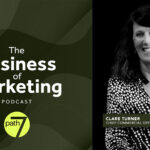By Jennifer Davidson, Founder, Sleek
The future of the event industry has arguably never looked so good. You only need to look as far as Taylor Swift to see the enormous power experiences have to capture people’s interest today – her Eras Tour has smashed records as the highest-grossing music tour ever.
Demand for live events and experiences has surged ever since the end of pandemic restrictions, and that trend is set to continue. Eventbrite’s annual forecasting guide reveals that 78% of attendees plan to spend as much or more on events this year compared to 2023.
Unsurprisingly, brands are keen to capitalise on that demand. The latest IPA Bellwether report identified events as the “stand-out” marketing category of Q1 2024, with a record net balance of +23.1% of companies having upped their budget.
Expectations for the rest of the 2024/25 financial year are just as strong – events are to be the main area of marketing budget growth by quite some margin. Brands crave that face-to-face, personal interaction with customers, and they’re willing to spend to get it.
However, many marketing teams are under pressure to prove the commercial value of their work. Finance directors expect to see returns on every investment, and compared to TV campaigns or easily measured digital ads, events aren’t always taken as seriously as they should be.
In this environment, it’s vital that marketers fully understand the true value events can deliver for businesses and are able to demonstrate it. But right now, that’s still a significant challenge.
Driving the short and long term
It’s no secret that some marketers have been asked to prioritise short-term commercial impact to help businesses through this tricky economic period. That pressure is affecting their expectations of events and brand activations; recent research by Somerset House found that 25% of brands want to increase sales with their activations, and 15% see activations as primarily a sales initiative.
Events can undoubtedly play a critical role in creating leads and driving sales. More importantly, they often deliver higher-quality leads than most other marketing tactics. Event attendees have already expressed interest in your brand, product, or service just by attending; therefore, the leads gathered are more qualified and more likely to convert.
You can see this effect in action when Apple and Samsung host launch events for their new phone models. These events are designed to drive sales by showcasing new product features, and they work. Apple’s launch events have helped turn the iPhone into a worldwide phenomenon.
But what’s sometimes forgotten is the power events have to drive brand and commercial value in the long term. Events offer brands a unique tool to strengthen their direct, personal relationships with their audiences, whether customers, potential leads, or other stakeholders.
The potential of this is multiple. Events can increase customer satisfaction, retention, and loyalty. They can also be leveraged as platforms for brand storytelling to craft positive perceptions and brand trust – an increasingly hard-fought-for commodity in this digital age.
Events are also a platform through which brands can build communities of dedicated brand advocates. Somerset House saw 28% of consumers say they attend a brand activation to ‘meet my tribe’; only 11% attend because they are currently ‘in the market to buy’.
By utilising social media, user-generated content (UGC), and partnership opportunities, marketers can extend the reach and influence of their events beyond those in the room, driving awareness and brand storytelling on a larger scale.
All of this builds the brand’s equity so that when customers do come into the market to buy, your brand is the first one that comes to mind. That drives commercial growth in the long term – and ultimately, long-term success is what all businesses strive for.
Measuring success
However, while research shows that 83% of marketers believe events are critical for their business growth, they face two key challenges: a lack of data to prove impact and a misalignment between marketing and business goals.
Finding ways to measure success is vital to proving the brand and business value of events. That should start with defining what success means to your business and event. Be clear on the outcomes you want to achieve from the very beginning: what key metrics do you want to drive beyond attendance numbers? Is it lead generation, pipeline value, media coverage, or brand metrics? Without knowing this, it’s impossible to gauge an event’s effectiveness.
From there, marketers must implement sophisticated post-event analysis and feedback mechanisms and calculate tangible and intangible ROI, just as they would for any advertising campaign. It’s a little trickier in events, but investing in that expertise will be more than worth it.
Ultimately, events are a multifaceted tool, as they can drive immediate commercial outcomes and cultivate long-term brand loyalty and engagement. By understanding and leveraging the true impact of events, marketers can unlock significant value for their businesses.
There’s no sign that the experiential marketing industry is slowing down, so the future looks bright. Marketers would be wise to get their ducks in a row now to reap the rewards.







